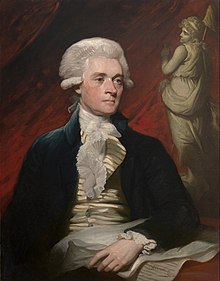
The First Barbary War (1801–1805), also known as the Tripolitan War and the Barbary Coast War, was a conflict during the Barbary Wars, in which the United States and Sweden fought against Tripolitania. Tripolitania had declared war against Sweden and the United States over disputes regarding tributary payments made by both states in exchange for a cessation of Tripolitatian commerce raiding at sea. United States President Thomas Jefferson refused to pay this tribute. Sweden had been at war with the Tripolitans since 1800.
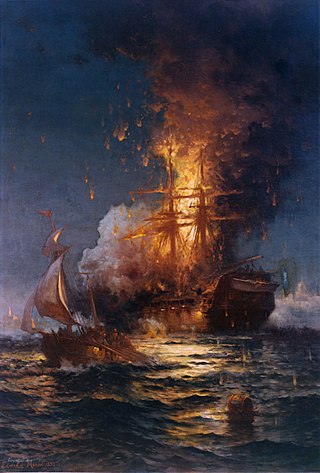
The Barbary Wars were a series of two wars fought by the United States, Sweden, and the Kingdom of Sicily against the Barbary states and Morocco of North Africa in the early 19th century. Sweden had been at war with the Tripolitans since 1800 and was joined by the newly independent US. The First Barbary War extended from 10 May 1801 to 10 June 1805, with the Second Barbary War lasting only three days, ending on 19 June 1815.

The Second Barbary War (1815) or the U.S.–Algerian War was fought between the United States and the North African Barbary Coast states of Tripoli, Tunis, and Algiers. The war ended when the United States Senate ratified Commodore Stephen Decatur's Algerian treaty on 5 December 1815. However, Dey Omar Agha of Algeria repudiated the US treaty, refused to accept the terms of peace that had been ratified by the Congress of Vienna, and threatened the lives of all Christian inhabitants of Algiers. William Shaler was the US commissioner in Algiers who had negotiated alongside Decatur, but he fled aboard British vessels during the 1816 bombardment of Algiers. He negotiated a new treaty in 1816 which was not ratified by the Senate until 11 February 1822, because of an oversight.
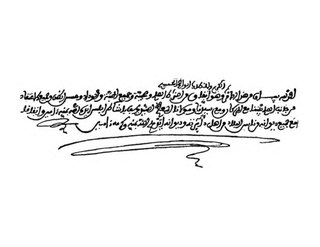
The Treaty of Tripoli was signed in 1796. It was the first treaty between the United States and Tripoli to secure commercial shipping rights and protect American ships in the Mediterranean Sea from local Barbary pirates.

William Eaton was a United States Army officer and the diplomatic officer Consul General to Tunis (1797–1803). He played an important diplomatic and military role in the First Barbary War between the United States and Tripoli (1801–1805). He led the first foreign United States military victory at the Battle of Derne by capturing the Tripoli subject city of Derne in support of the restoration of the pasha, Hamet Caramelli. He also gave testimony at the treason trial of former Vice President Aaron Burr. Eaton served one term in the General Court of Massachusetts, which is the state legislature both during and after the colonial era. Eaton died on June 1, 1811, at the age of 47.

The Barbary pirates, Barbary corsairs, or Ottoman corsairs were mainly Muslim pirates and privateers who operated from the Barbary states. This area was known in Europe as the Barbary Coast, in reference to the Berbers. The main purpose of their attacks was to capture slaves for the Barbary slave trade. Slaves in Barbary could be of many ethnicities, and of many different religions, such as Christian, Jewish, or Muslim. Their predation extended throughout the Mediterranean, south along West Africa's Atlantic seaboard and into the North Atlantic as far north as Iceland, but they primarily operated in the western Mediterranean. In addition to seizing merchant ships, they engaged in razzias, raids on European coastal towns and villages, mainly in Italy, France, Spain, and Portugal, but also in the British Isles, the Netherlands, and Iceland.
The first USS George Washington was a frigate in the United States Navy. She was named after United States Founding Father and President George Washington.

USS Guerriere was the first frigate built in the United States since 1801. The name came from a fast 38-gun British frigate captured and destroyed in a half-hour battle by USS Constitution on 19 August 1812. This victory was one of the United States' first in the War of 1812.

The Mediterranean Squadron, also known as the Mediterranean Station, was part of the United States Navy in the 19th century that operated in the Mediterranean Sea. It was formed in response to the First and Second Barbary Wars. Between 1801 and 1818, the squadron was composed of a series of rotating squadrons. Later, squadrons were sent in the 1820s to the 1860s to suppress piracy, primarily in Greece and to engage in gunboat diplomacy. In 1865 the force was renamed the European Squadron.
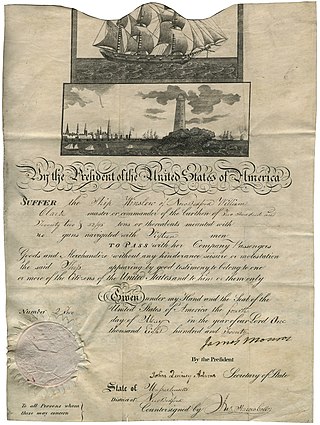
The Mediterranean pass was a document which identified a ship as being protected under a treaty with states of the Barbary Coast. Such a treaty exacted tribute in exchange for protection from Barbary pirates capturing that country's ships and crews. These passes identified ships which had safe passage.
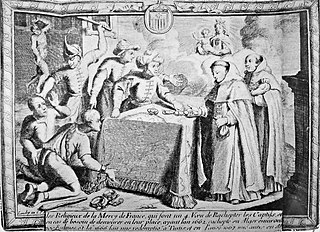
The Barbary slave trade involved slave markets in the Barbary states. European slaves were acquired by Muslim Barbary pirates in slave raids on ships and by raids on coastal towns from Italy to the Netherlands, Ireland and the southwest of Britain, as far north as Iceland and into the Eastern Mediterranean.

In July 2001, President Abdelaziz Bouteflika became the first Algerian President to visit the White House since 1985. This visit, followed by a second meeting in November 2001, and President Bouteflika's participation at the June 2004 G8 Sea Island Summit, is indicative of the growing relationship between the United States and Algeria. Since the September 11 attacks in the United States, contacts in key areas of mutual concern, including law enforcement and counter-terrorism cooperation, have intensified. Algeria publicly condemned the terrorist attacks on the United States and has been strongly supportive of the international war on terrorism. The United States and Algeria consult closely on key international and regional issues. The pace and scope of senior-level visits has accelerated.

Thomas Barclay was an American merchant, consul, and diplomat. He served as the United States' consul in France (1781–1787) and, during his time as a diplomat, negotiated the United States' first treaty, the Moroccan–American Treaty of Friendship, with the sultan of Morocco in 1786. He was the first American diplomat to die in a foreign country in the service of the United States.
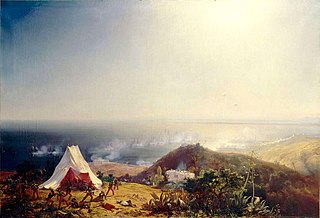
The invasion of Algiers in 1830 was a large-scale military operation by which the Kingdom of France, ruled by Charles X, invaded and conquered the Deylik of Algiers.

Anglo-Turkish piracy or the Anglo-Barbary piracy was the collaboration between Barbary pirates and English pirates against Catholic shipping during the 17th century.

The Danish–Algerian War was a conflict lasting from 1769 to 1772 between Denmark–Norway and Deylik of Algiers. which was functionally and mostly independent from the Ottoman Empire. It is also known as the Algerian Expedition, or "The War Against Algeria".

The French-Algerian War of 1681–1688 was part of a wider campaign by France against the Barbary Pirates in the 1680s.

Slavery is noted in the area later known as Algeria since antiquity. Algeria was a center of the Trans-Saharan slave trade route of enslaved Black Africans from sub-Saharan Africa, as well as a center of the slave trade of Barbary slave trade of Europeans captured by the barbary pirates.

The Algerian–American war took place between 1785 and 1795 between the freshly independent United States of America and the Regency of Algiers which began attacking American shipments. One of the reasons for the war was a British sabotage efforts against the Americans, whom informed the Algerians of the vulnerability of the American ships, and may have hired or supported the Barbary pirates operating out of the Algerian ports.
The Swedish–Algerian war of 1791–1792 was a brief and inconclusive conflict between Sweden and the Regency of Algiers.
